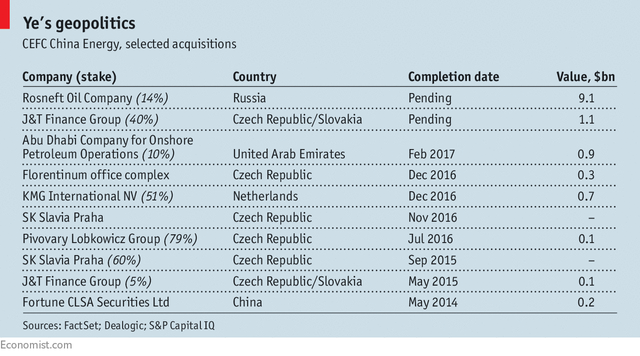A Chinese oil baron is reportedly detained by the authorities
STAFF had routinely been directed to pore over their chairman’s speeches and learn from them. One which Ye Jianming, the 40-year-old founder of CEFC, delivered last autumn—“Only One Step From Midsummer to Harsh Winter”—was a historical tale meant to motivate the troops. In it he compared his firm’s swift rise to that of Hu Xueyan, a 19th-century merchant banker. Hu amassed a fortune trading in salt, tea, arms and silk through close ties to China’s imperial elites, then fell from grace and went bankrupt.
Mr Ye did not mean the lesson to be pertinent to his own situation. CEFC was then enjoying its own midsummer. As China’s largest private oil group, it had just won a 14.2% stake in Russia’s state-backed oil firm, Rosneft, paying $9.1bn for one of the most significant shares of the world’s largest listed oil firm by production. Industry analysts outside China had been scrambling to study CEFC since early 2017 when it joined national oil heavyweights such as Total and BP in winning a stake, of 4% for 40 years, in the largest oil concession of the Abu Dhabi National Oil Company, in the United Arab Emirates.
Upgrade your inbox and get our Daily Dispatch and Editor's Picks.
But harsh winter appears to have set in. On March 1st Caixin, a business magazine, reported that Mr Ye had been placed under investigation (CEFC denied the “irresponsible” report). The news came less than a week after the Chinese government announced it had taken over Anbang, a high-flying and highly indebted insurer, for a period of one year, and that it would prosecute its boss, who has not been seen since his own detention last June, for economic crimes. The South China Morning Post, Hong Kong’s main English-language newspaper, then reported that a Shanghai government agency, Guosheng Group, had taken over CEFC’s management and daily operations. CEFC this week denied the takeover by Guosheng Group, saying it had not received any relevant notice.
The gravest scenario would be outright nationalisation of CEFC through a takeover by one of China’s state-owned oil champions. Mr Ye’s fate would fit a pattern of recent crackdowns on over-ambitious tycoons and the freewheeling financing of their firms. Anbang raised cash by selling high-risk insurance products to fund brash overseas dealmaking. Wanda and HNA, two other overstretched companies, are selling assets to repay their debts after censure from regulators. Yet in the case of CEFC, the precise reasons for Mr Ye’s alleged troubles are still a mystery.
<figure class="blog-post__inline-image blog-post__inline-image--generic">
Acquisitions at the firm are on hold, say employees close to its dealmakers. Its financing, much of which came from state-owned lenders, has been cut as banks press it to repay loans. They say that asset disposals, including the sale of its stake in oil fields in Abu Dhabi, are under discussion. Analysts reckon that an apparent hold-up on the Rosneft deal, expected to close early this year, could now be explained by the news of the investigation.
From his hometown of Fujian, a southern province rich in tea plantations and talented entrepreneurs, Mr Ye founded a trading firm at the age of 25, buying refineries and storage tanks in China. His oil colossus is thought to be among the ten largest private firms in the country, with 50,000 employees and assets of 183bn yuan ($29bn), ranging from investments in Kazakhstan’s refineries to stakes in an airline and a football club in the Czech Republic.
Mr Ye’s reported detention is all the more puzzling given CEFC’s close ties to government projects and the state banks that fund them. A bond prospectus from June shows that close to two-thirds of its financing, or 32bn yuan, was from China Development Bank. Observers note that CEFC has aligned itself with schemes such as the Belt and Road Initiative of Xi Jinping, China’s president (a vast network of infrastructure projects in central Asia, eastern Europe and the Middle East). Mr Ye proclaimed that if the Rosneft deal were finalised, “70% of the credit” should go to the state for its national strategy.
Leslie Zhang, vice-president of the United Energy Group, an oil firm in Hong Kong, says CEFC’s deals are unusual among Chinese peers for “investing in countries over projects”. Observers say it has often hired former diplomats, creating ties with overseas governments that allow it to do business with explicit state blessing—or the semblance of it.
CEFC is among many private firms that have been trying to “use the logic of the party to do deals”, says Andrew Polk of Trivium China, a research firm in Beijing. Its chief may yet extract himself, as did the boss of Fosun, a mining-to-tourism conglomerate, who disappeared for a short while in 2015 to assist authorities in an investigation. But Mr Ye and his peers are on slippery ground.